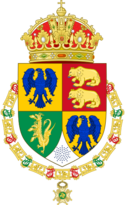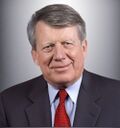User:Belfras/Sandbox12: Difference between revisions
No edit summary |
No edit summary |
||
| Line 2: | Line 2: | ||
{{Politics of Belfras|state=expanded}} | {{Politics of Belfras|state=expanded}} | ||
The '''Cabinet of Belfras''' is the main executive body of [[Belfras]] made up of | The '''Cabinet of Belfras''' is the main executive body of [[Belfras]] and is made up of two bodies; The **** Assembly and the Council of Magistrates. The [[Monarchy of Belfras|Sovereign Prince]] in their duty as head of state and chief executive is the head of the cabinet which acts on their behalf. The Sovereign personally appoints ministers and appointees to the Assembly which is the higher of the two bodies and requires no approval for appointments, although often discusses potential appointments with the Royal Chancellor and the Consul. While most appointments to the Assembly are heads of the Sovereigns ministries, some are appointed due to their position in other bodies (such as the Chief of the Military Council) and some, such as the Royal Chancellor, are selected due to their relationship with the Sovereign and ability to act as a chief advisor in their field. | ||
Serving the Assembly is the second of the two bodies, the Council of Magistrates. The head of this council is the [[Consul of Belfras|Consul]], the most senior elected official and who leads the senate on the Sovereigns behalf. The Council is primarily made up of the Praetors, whos Praetorships reside in the ministries led by members of the Assembly. These Praetorships are established to have a set portfolio of responsibilities within their ministry and report to their respective minister who, in turn, reports to the sovereign. While none of these offices have a set term or a limit of terms, they rely on two factors. The Ministers rely on having the confidence of the sovereign in their position and may be replaced at the Sovereigns discretion. Praetors require both the confidence of their minister and the people, as almost all Praetors to have sit in office have been from the leading party in the senate. | |||
Constitutionally the cabinet has no direct executive power and functions primarily as an advisory body to the sovereign. In practice, however, the sovereign relies on their ministers to make decisions for them in their fields that do not require the sovereigns attention and likewise the ministers rely on their Praetors to make decisions on matters that do not require their attention either. All decisions will comply with set policy laid out by the sovereign and breaches of said policy have historically always resulted in that person being removed from office immediately. Ever since the cabinets creation it has enjoyed a freedom to debate proposed decisions by the sovereign and express their opinion on any aspect of policy and legislature. Disagreements within the cabinet are often mediated by the Sovereign themselves, the Royal Chancellor if said disagreement involves the sovereign, and the Consul if disagreements are within the Council of Magistrates. | |||
Regardless of the freedom of discussion within the cabinet, it relies on heavy compliance once the sovereign has made a decision on policy or legislation. All members of cabinet are bound to the decision and are obligated to support it publicly, with anybody within the cabinet being unable to support a decision publicly is obliged to step down. People within the cabinet who feel as if a decision requires opposition is also required to step down and take said opposition to the senate. Typically an effort is made to reach a consensus on any decision made and in the event of disagreements the sovereign has been known to take a vote, although said vote is always non-binding and acts as an instrument for the sovereign on the mindset of their cabinet members prior to making a decision. | |||
== Composition and responsibilities == | == Composition and responsibilities == | ||
The cabinet is comprised of two | The cabinet is comprised of two levels; The **** Assembly and the Council of Magistrates. The former consists of individuals personally appointed by the sovereign for an indeterminate amount of time who will conduct duties on behalf of the sovereign. These duties can involve running a government ministry, conducting a set role set out by the sovereign on their appointment, or representing a body such as the Chief of the Military Council representing the armed forces. The Assembly is headed personally by the Sovereign who utilises it to run the government and his deputy within the Assembly, the Royal Chancellor, is considered his closest political advisor and will lead Assembly meetings in the Sovereigns absence. Appointments within the Assembly are considered permanent, with the person remaining in their position until their departure either at the Sovereigns command or voluntarily. Assemblies are often vacated when a new monarch is coronated for reappointments, although in the two coronations the Federation has undergone only three ministers have been replaced by the arriving sovereign. | ||
The Magistrates | The Council of Magistrates is the second level of government within the cabinet and is comprised of the Consul, it's head, and a number of senators appointed to leadership positions most often referred to as Praetorships. The magistrates, known as Praetors in these positions, function in the ministries led by members of the Assembly. The Praetorships have a set portfolio that will grant them responsibilities within the ministry and will place them under the responsibility of the minister who will become their superior officer. The seats within the Council have no set terms but rely on two dominating factors; The confidence of their minister, who may appeal to the Consul for the Praetor to be removed and the reliance on their party remaining the largest. Only three Praetors in the history of the cabinet have not been from the ruling party and all of them have been in extraordinary circumstances. | ||
The leading member of the Council is the Consul, the head of the largest party who will act as the presiding officer of the senate and the administrative head of all members in the Council. The lack of a set term for ministers and magistrates have resulted in extraodinarily long terms, such as Michael Feddici who became the longest serving minister having served as the Minister of Defence from 1946 to 1986. | |||
== Current Cabinet == | == Current Cabinet == | ||
Revision as of 11:48, 16 January 2021
This article is incomplete because it is pending further input from participants, or it is a work-in-progress by one author. Please comment on this article's talk page to share your input, comments and questions. Note: To contribute to this article, you may need to seek help from the author(s) of this page. |
| This article is part of a series on the |
| Politics of Belfras |
|---|
 |
The Cabinet of Belfras is the main executive body of Belfras and is made up of two bodies; The **** Assembly and the Council of Magistrates. The Sovereign Prince in their duty as head of state and chief executive is the head of the cabinet which acts on their behalf. The Sovereign personally appoints ministers and appointees to the Assembly which is the higher of the two bodies and requires no approval for appointments, although often discusses potential appointments with the Royal Chancellor and the Consul. While most appointments to the Assembly are heads of the Sovereigns ministries, some are appointed due to their position in other bodies (such as the Chief of the Military Council) and some, such as the Royal Chancellor, are selected due to their relationship with the Sovereign and ability to act as a chief advisor in their field.
Serving the Assembly is the second of the two bodies, the Council of Magistrates. The head of this council is the Consul, the most senior elected official and who leads the senate on the Sovereigns behalf. The Council is primarily made up of the Praetors, whos Praetorships reside in the ministries led by members of the Assembly. These Praetorships are established to have a set portfolio of responsibilities within their ministry and report to their respective minister who, in turn, reports to the sovereign. While none of these offices have a set term or a limit of terms, they rely on two factors. The Ministers rely on having the confidence of the sovereign in their position and may be replaced at the Sovereigns discretion. Praetors require both the confidence of their minister and the people, as almost all Praetors to have sit in office have been from the leading party in the senate.
Constitutionally the cabinet has no direct executive power and functions primarily as an advisory body to the sovereign. In practice, however, the sovereign relies on their ministers to make decisions for them in their fields that do not require the sovereigns attention and likewise the ministers rely on their Praetors to make decisions on matters that do not require their attention either. All decisions will comply with set policy laid out by the sovereign and breaches of said policy have historically always resulted in that person being removed from office immediately. Ever since the cabinets creation it has enjoyed a freedom to debate proposed decisions by the sovereign and express their opinion on any aspect of policy and legislature. Disagreements within the cabinet are often mediated by the Sovereign themselves, the Royal Chancellor if said disagreement involves the sovereign, and the Consul if disagreements are within the Council of Magistrates.
Regardless of the freedom of discussion within the cabinet, it relies on heavy compliance once the sovereign has made a decision on policy or legislation. All members of cabinet are bound to the decision and are obligated to support it publicly, with anybody within the cabinet being unable to support a decision publicly is obliged to step down. People within the cabinet who feel as if a decision requires opposition is also required to step down and take said opposition to the senate. Typically an effort is made to reach a consensus on any decision made and in the event of disagreements the sovereign has been known to take a vote, although said vote is always non-binding and acts as an instrument for the sovereign on the mindset of their cabinet members prior to making a decision.
Composition and responsibilities
The cabinet is comprised of two levels; The **** Assembly and the Council of Magistrates. The former consists of individuals personally appointed by the sovereign for an indeterminate amount of time who will conduct duties on behalf of the sovereign. These duties can involve running a government ministry, conducting a set role set out by the sovereign on their appointment, or representing a body such as the Chief of the Military Council representing the armed forces. The Assembly is headed personally by the Sovereign who utilises it to run the government and his deputy within the Assembly, the Royal Chancellor, is considered his closest political advisor and will lead Assembly meetings in the Sovereigns absence. Appointments within the Assembly are considered permanent, with the person remaining in their position until their departure either at the Sovereigns command or voluntarily. Assemblies are often vacated when a new monarch is coronated for reappointments, although in the two coronations the Federation has undergone only three ministers have been replaced by the arriving sovereign.
The Council of Magistrates is the second level of government within the cabinet and is comprised of the Consul, it's head, and a number of senators appointed to leadership positions most often referred to as Praetorships. The magistrates, known as Praetors in these positions, function in the ministries led by members of the Assembly. The Praetorships have a set portfolio that will grant them responsibilities within the ministry and will place them under the responsibility of the minister who will become their superior officer. The seats within the Council have no set terms but rely on two dominating factors; The confidence of their minister, who may appeal to the Consul for the Praetor to be removed and the reliance on their party remaining the largest. Only three Praetors in the history of the cabinet have not been from the ruling party and all of them have been in extraordinary circumstances.
The leading member of the Council is the Consul, the head of the largest party who will act as the presiding officer of the senate and the administrative head of all members in the Council. The lack of a set term for ministers and magistrates have resulted in extraodinarily long terms, such as Michael Feddici who became the longest serving minister having served as the Minister of Defence from 1946 to 1986.
Current Cabinet
| The **** Assembly | Title | Duties | Appointed | |||
|---|---|---|---|---|---|---|

|
His Majesty Nicholaus (Born 1955) |
Sovereign Prince Sovereign of the Belfrasian Federation |
Coronated 19 April 1980 | |||

|
The Illustrious Leo Casitus (Born 1963) |
The Royal Chancellory Royal Chancellor |
|
2 February 1982 | ||

|
The Illustrious Valentina Lentulus (born 1971) |
Ministry of Foreign Affairs Foreign Minister |
|
5 August 2011 | ||

|
The Illustrious Adam Potrias (Born 1958) |
Ministry of Defence Minister of Defence |
|
14 October 2010 | ||
| File:VenantiusGregoras.jpeg | Venantius Gregoras (born 1976) |
Ministry of Business and Energy Minister of Business |
|
11 April 2001 | ||
| File:AaronTullus.jpeg | Aaron Tullus (Born 1964) |
Ministry of the Treasury Minister of the Treasury |
|
20 September 2012 | ||

|
Constantine Manilan (born 1973) |
Ministry of National Security Minister of National Security |
|
1 January 2021 | ||
| File:CassandraVengardos.jpeg | Cassandra Vengardos (born 1980) |
Ministry of Justice Minister of Justice |
|
21 August 2017 | ||
| File:PhilippusSevso.jpeg | Philippus Sevso (born 1968) |
Ministry of the Interior Minister of the Interior |
|
3 April 2014 | ||
| File:CarviliaUlpius.jpeg | Carvilia Ulpius (born 1988) |
Ministry of Housing and local government Minister of Housing and Local Government |
|
15 January 2021 | ||
| File:IsaacKurkuas.jpeg | Isaac Kurkuas (born 1972) |
Ministry of Transport Transport Minister |
|
20 December 2007 | ||
| File:HannoDurus.jpeg | Hanno Durus (born 1977) |
Ministry of Culture and Sport Minister of Culture and Sports |
|
8 September 2011 | ||
| File:ArethasDiogenus.jpeg | Arethas Diogenus (born 1968) |
Ministry of Education Education Minister |
|
27 August 2006 | ||
| File:ManuelLucaenus.jpeg | Manuel Lucaenus (born 1980) |
Ministry of Work and Pensions Minister of Work and Pensions |
|
4 June 2018 | ||
| File:ThomasRensino.jpeg | Thomas Rensino (born 1947) |
Ministry of Health and Social Care Minister of Health and Social Care |
|
14 May 2020 | ||

|
General Anastasios Dialetis (born 1960) |
Special appointee Chief of the military council |
|
1 January 2017 | ||

|
Serena Planuda (born 1982) |
Special Appointee Attorney General of the Federation |
|
15 August 2020 | ||
Council of Magistrates
| Council of Magistrates | Title | Portfolio | Term of office | |||
|---|---|---|---|---|---|---|

|
Theodosius Lupis (born 1963) |
Consul | First Magistrate
|
2 May 2015 | ||

|
Konstantina Golia (born 1965) |
Proconsul |
|
2 May 2015 | ||
| PICTURE | NAME | Ministry of Foreign Affairs Praetor for embassies and foreign development |
|
12 September 2016 | ||
| PICTURE | NAME | Ministry of Foreign Affairs Praetor for global advisory |
|
1 August 2017 | ||
| PICTURE | NAME | Ministry of Foreign Affairs Praetor for Kayamuca Affairs |
|
20 December 2020 – Incumbent | ||

|
Phiobe Maleinos (born 1985) |
Ministry of Defence Praetor for the Guard |
|
5 July 2019 | ||

|
Alexander Gailius (Born 1977) |
Ministry of Defence Praetor for Defence |
|
5 July 2019 | ||

|
Domianus Palamas (born 1942) |
Ministry of National Security Praetor for National Security |
|
14 January 2005 | ||
| File:VictorTerentios.jpeg | Victor Terentios (born 1988) |
Ministry of National Security Praetor for Crime & Policing |
|
18 April 2015 | ||
| File:AgnesPlanuda.jpeg | Agnes Planuda (born 1961) |
Ministry of National Security Praetor for Immigration & Border control |
|
5 March 2018 | ||
| File:FlaviusTremorinus.jpeg | Flavius Tremorinus (Born 1968) |
Ministry of health and social care Praetor for Health and Social Care |
|
13 August 2016 | ||
| File:JohnAntonius.jpeg | John Antonius (born 1976) |
Ministry of the Treasury Praetor for the Treasury |
|
1 December 2014 | ||
| File:PeterSergia.jpeg | Peter Sergia (born 1979) |
|
20 July 2011 | |||
! colspan="6" style="background: lavender;"| Great Officers of State |-
Ministries
Editor Comments
- Title of page to be Cabinet of Belfras